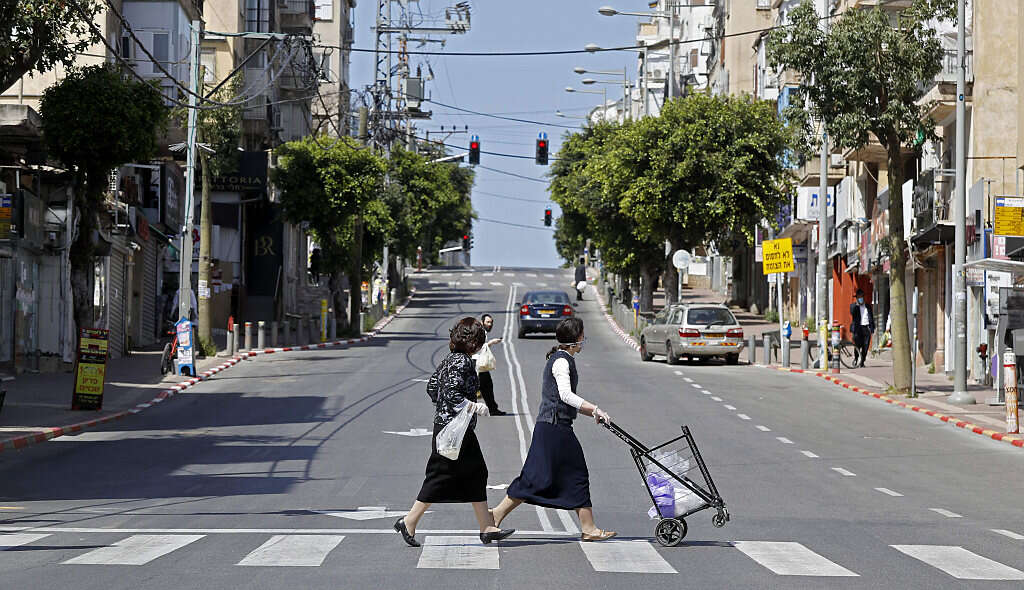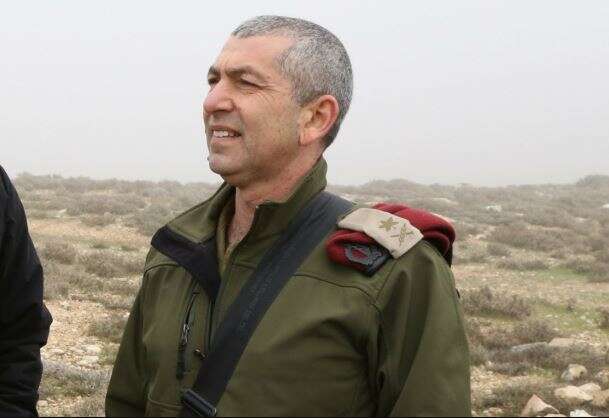"We are currently undertaking delaying actions. We have to increase significantly the number of tests we're carrying out in Bnei Brak. If this does not happen immediately, we will face a far more severe crisis," warns Maj. Gen. (res.) Roni Numa, the head of the Bnei Brak emergency coronavirus task force and the person in effect charged with managing the crisis in the city.
In a special interview with Israel Hayom, Numa says, "There are 1000 confirmed carriers in the city, but I believe that the numbers are far greater. The number of people in self-isolation is also far higher than the reported number, including because of the fact that the way we carry out these checks in Israel [mostly through cellphone data YL] is irrelevant in a city like Bnei Brak where 50 percent of residents do not have a smartphone."
Follow Israel Hayom on Facebook and Twitter
Numa says that Bnei Brak is facing a serious crisis of functioning. "We are currently trying to build a system that can give us a much more accurate picture of what is being done in the city medically, logistically and in welfare," he says.
As part of this effort, IDF Home Front and intelligence experts from the 98th Division have been tasked with producing an accurate assessment of the situation. The objective, says Numa, "is to know what's happening in every apartment in Bnei Brak."
In addition, officials will be given responsibility for each street, and then each building.
"Every soldier will be allocated four-five families that he has to maintain constant contact with and his job will be to make sure that they are ok and to meet their every need," he explained.
"The residents of Bnei Brak and beginning to understand that we really are here to help them. It will take a day or two, but I think that by the middle of the week already they will trust us completely and understand that no, we have not come to suffocate them or put them into ghettos as some had claimed – but rather, to help them."
The soldiers deployed on the streets of Bnei Brak will be in their uniforms, but will not be armed, and will be in orange hats and high-visibility vests. "They will not be involved in law and order, only in relief efforts," Numa clarifies. "I am aware of the advantages and disadvantages of this, but at the moment, the city is in crisis and a solution is needed. This is absolutely life-saving work."

'Situation in Bnei Brak is unique
Numa describes what is happening now in Bnei Brak as a delaying action with the purpose of preventing wider coronavirus infection outside of the city.
"I believe that the current policy of restrictions of movement into and out of Bnei Brak will be kept in place," he says. "It won't be for just a few days or weeks, and I also don't believe that life will return to normal after Passover. It will take many weeks, maybe longer. Perhaps in other places, it will take less time, but not in Bnei Brak."
Q: Why?
"Because we won't be able to do it before the entire city has been tested and we know who has been infected and has recovered, i.e. who is part of the immune population that can be allowed to return to normal routine and help the city return to life. This means conducting extensive serological testing [which looks for antibodies to the virus YL]. This isn't happening yet."
Q: The defense minister has talked about removing the geriatric population that is at high risk from the city.
"There are a lot of good ideas, but they're not implementable. If we transfer the entire geriatric population to a hotel, and if one of them is infected – we get a whole coronavirus hotel. And we're talking about a population where some require nursing care or have special needs and it will be hard to treat them outside of their homes."
Q: So what's the solution?
"To work quicker. To test and to respond. To try and isolate the elderly as much as possible in their homes, but testing is the most important thing. More and more tests. We are severely behind on this."
Q: Is the public cooperating with you?
"I understand that there were more than a few difficulties at first, but as soon as Rav Kanievsky understood the situation and made clear statements – the results on the ground have been palpable. We have to understand that this public does not see the same news that we do, and that it requires special explanations which involves various complexities. But it is also a very disciplined population, which carries out the instructions it is given by the rabbis and the doctors, and that's how we're trying to influence them."
Q: What are you lacking?
"The governmental system is on board, but there are quite a few bottlenecks. I will say it over and over again – the main problem is the low level of testing, which simply is not suitable to a population in a place like Bnei Brak. If everywhere the rate of infection is about three percent – here it is six percent, so the disease is spreading at twice the speed and therefore it is critical to test quickly and widely."

And what about other problems mostly caused by the bureaucracy of the public and government sector? For example, a patient's contact is with the doctor from his Health Maintenance Organization, but in order to reach a decision on where they will be treated – at hospital, in a hotel, or at home – approval is needed from much higher levels. "Sometimes it takes a day, and we don't have that time because of the danger of transmission. We need much faster answers. All of the authorities need to be here on the ground," he says.
Q: What is Passover going to look like in Bnei Brak?
"It is clear to us today that Purim accelerated the infection. If the population is not disciplined, Passover will be a similar accelerator. The rabbis understand this and are cooperating with us, for example on how to carry out the religious requirements of the festival. I hope that the public cooperates."
Numa's main fear is that the city's elderly population will participate in Seder night and be exposed to the disease. As it is, he says, many in the city are not reporting that they are sick for fear that they will be removed from their homes before the festival and leave their families alone.
As part of the public information efforts, leaflets will today be handed out to all homes in which the rabbis make it clear that the public must fully comply with all the guidelines and directives.
Q: There was a lot of criticism of how the ultra-Orthodox community initially acted in the first stages of the pandemic.
"Now is not the time for criticism, even if some of it is justified. Right now, the most important thing is to come together and help this population."
For this reason, Numa – a former commander of the Israel Air Force's elite Shaldag Unit, the Nahal infantry brigade, and former GOC Central Command – volunteered for this assignment.
On Tuesday, Bnei Brak Mayor Avraham Rubinstein called him in for a meeting and asked him to enlist, voluntarily of course. "When I saw their faces and understood the enormity of the crisis, I didn't hesitate for a moment," he says, "it was impossible not to respond to their request."
Q: Now they're talking about the next crises – Elad, Jerusalem's Mea Shearim, Tiberias, as well as Arab and Bedouin population centers. What do you think should be done there?
"Purpose-built models must be immediately created for every potential outbreak epicenter. Understand what needs to be done, how the population can be influenced, what are the needs and the limitations. These places can't be treated in the usual way. They must be given operational capabilities that work at a far, far higher level."





